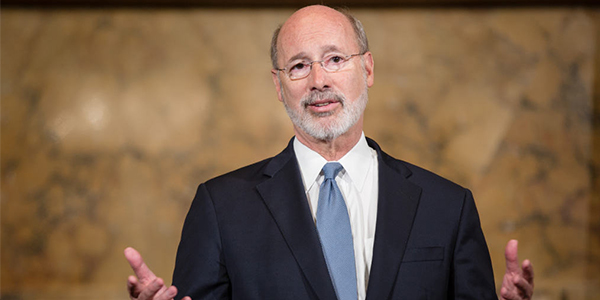By Christen Smith
Pennsylvania Gov. Tom Wolf (D) signed an executive order Thursday directing the state’s Department of Environmental Protection to join the Regional Greenhouse Gas Initiative (RGGI) — a move that left the legislature’s Republican majority bewildered and outraged.
Wolf instructed the department to craft rules that “abate, control or limit carbon dioxide emissions from fossil-fuel-fired electric power generators” and establish “a carbon dioxide budget” on par with the other nine RGGI states no later than July 31, 2020. If approved by the commonwealth’s Environmental Quality Board, Pennsylvania would join fellow PJM states Delaware and Maryland.
“Climate change is the most critical environmental threat confronting the world, and power generation is one of the biggest contributors to greenhouse gas emissions,” Wolf said Thursday. “Given the urgency of the climate crisis facing Pennsylvania and the entire planet, the commonwealth must continue to take concrete, economically sound and immediate steps to reduce emissions. Joining RGGI will give us that opportunity to better protect the health and safety of our citizens.”
According to RGGI, it has reduced its members’ power sector CO2 pollution by 45% over the last 14 years and provided $2.31 billion in lifetime energy bill savings. Participating states — either through regulation or legislation — cap power plant emissions and auction off credits to generators on a quarterly basis, who purchase these allowances as proof of compliance. The proceeds return to participating states for reinvestment.
“We know that we can’t complete this process in a vacuum,” Wolf said. “The conversation we’ve begun over the past year needs to continue if we are going to craft regulations that fit Pennsylvania’s unique energy mix, while making sure that the transition to a cleaner energy mix doesn’t leave behind workers and communities our state has relied on for decades to produce its power. And it will take buy-in from the legislature to ensure we’re protecting Pennsylvanians from the increasing effects of the climate crisis.”
Firm Opposition
But many of the state’s lawmakers want nothing to do with RGGI.
Republicans in both the House of Representatives and Senate challenged Wolf’s unilateral move as an overreach and argued that the program is nothing more than a tax increase that harms the state’s thriving fossil fuel industry and — ultimately — ratepayers. Pennsylvania is second only to Texas in natural gas production and provides nearly 20% of national demand — a figure expected to double by 2040.
“We strongly disagree with Gov. Wolf’s continued practice of go-it-alone approaches that are unhelpful in working cooperatively to move our commonwealth forward in a way that best represents the interests of all Pennsylvanians,” House Republican leadership said in a joint statement published Thursday. “Our state is not an autocracy, and one-sided decisions as significant as this leave out the important voices of Pennsylvania workers, communities and families whose livelihood is built upon important sectors of our energy economy.”
The Republican leaders went on to tout the natural gas industry’s impact on electricity bills and greenhouse gases “without burdensome regulations” and cited federal data that show a 14% decline in carbon emissions from the proliferation of gas across the country and 30% in Pennsylvania alone.
“We believe the executive branch cannot bind the state into multistate agreements without the approval of the General Assembly, and we plan to execute the fullest extent of our legislative power on behalf of the people of Pennsylvania,” the letter concludes.
Republican leaders in the Senate said they would only consider policies that further reduce greenhouse gases in a manner consistent with their caucus’s own energy principles — including preserving the state’s energy portfolio, protecting the existing workforce, keeping electricity rates low and implementing any carbon-reduction plan through “an appropriate legal manner.”
“Throughout the last 10 years, we have supported many initiatives that have resulted in Pennsylvania’s greenhouse gas reductions that eclipse the CO2 reductions in RGGI states,” Senate President Pro Tempore Joe Scarnati and Majority Leader Jake Corman said in a joint statement. “As a net-exporter of electricity, we know that energy production is a vital part of our state’s economy.
“We expect that the legislature will have the opportunity to engage in this process, to make sure that any change in energy policy ensures a balance between safeguarding the environment, preserving energy jobs and protecting ratepayers.”
Republican Sen. Gene Yaw, chairman of the Environmental Resources and Energy Committee, chimed in on Twitter, where he expanded upon another one of his caucus’s energy tenets: requiring current RGGI members to “utilize all aspects of the state’s robust energy portfolio.”
“It’s clear to me we have very little in common with [New York], [New Jersey] and the New England states,” he said. “How can we have a common interest with them when they prohibit the importation of our gas? They thumb their nose at Pennsylvania gas and embrace and purchase gas from Russia!”
‘Display of Leadership’
Democrats, however, celebrated the governor’s decision, including Senate Minority Leader Jay Costa, who proposed his own cap-and-invest program over the summer to address carbon emissions. (See Pa. Dem Leader Pushes Cap-and-Invest Energy Plan.)
“Today’s executive order is a strong display of leadership from the governor on one of the most serious issues facing Pennsylvania, this nation and the world,” he said. “Leadership from the federal government is not coming on climate change, and we can’t afford to wait.”
DEP Secretary Patrick McDonnell said RGGI “represents a unique opportunity for Pennsylvania to become a leader in combating climate change and grow our economy by partnering with neighboring states.”
“As a major electricity producer, Pennsylvania has a significant opportunity to reduce emissions and demonstrate its commitment to addressing climate change through a program with a proven track record,” he said.




